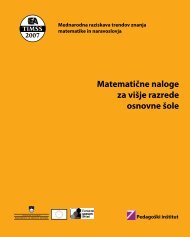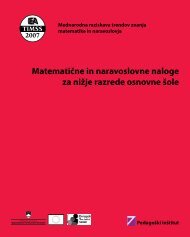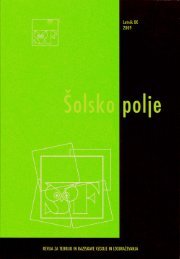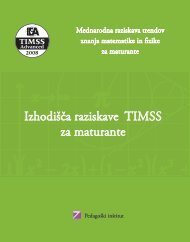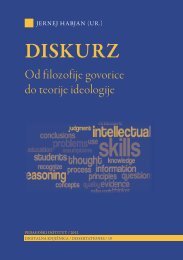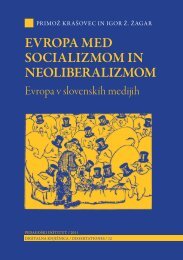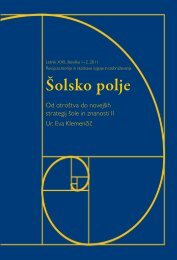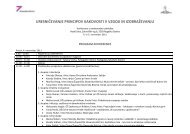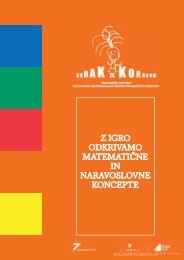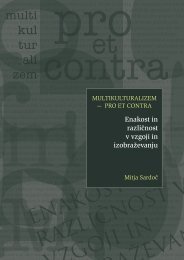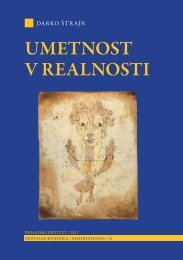82 ŠOLSKO POLJE LETNIK <strong>XX</strong> ŠTEVILKA 5/6ves the suppression and filtering of some meaning potentials of a discourse(Chouliaraki and Fairclough, 1999), it is also a process which may expandmeaning potential, through additions to, and elaborations upon, the previoustext. As Bernstein claims, particular social fields, and networks of socialpractices, have been associated with »recontextualizing principles« (Bernstein,1990). These are specific »principles« according to which they incorporateand re-contextualize social events. These principles underlie differencesbetween the ways in which a particular type of social event is represented indifferent fields, networks of social practices, and genres. Fairclough (2003:139–140) develops the following principles: Presence (e.g. which elementsof events, or events in a chain of events, are present/absent, prominent/background?), Arrangement (e.g. how are events ordered?), Abstraction (e.g.what degree of abstraction/generalization from concrete events?), and Additions(e.g. what is added in representing particular events – explanation/legitimizations (reasons, purposes), evaluation?). Critical discourse analysisalso sees recontextualization in terms of a dialectical colonization/appropriation.Recontextualization is a specific kind of a dialectic that appropriatesand colonizes discourses from different spaces and times (Chouliaraki andFairclough, 1999). The concept of appropriation accentuates the fact that,even in the process of colonizing, a new discourse enters potentially transformativerelationships with existing discourses in the recontextualizingcontext. In this respect, our study attempts to uncover how Serbian nationaltelevision appropriated Karadžić’s arrest into a nationalistic discourse, whilehelping to create a specific type of nostalgic nationalism.In order to identify TS’s recontextualization, we also analyze how TSrepresented the main social actors, i.e. who is included within the »us«realm and who is positioned as »them«. As Hodge and Kress (1993) argue,one of the central discursive strategies in ideological struggles relies onthe construction of in-and-out group identities using discursive means.We adopt Hall’s »discourse of difference« (1989: 913) as the most effectivemethod to think through binary positions.DataWe analyzed all 78 news items broadcast on all TS news programs from 21 ofJuly (the day of Karadžić’s arrest) up until 30 of July, 2008 (the day when Karadžićwas sent to The Hague). Why this particular time-frame? As argued, itwas during this period that the political situation in Serbia was intense, sincethe majority of opposition strongly challenged the president, government,
JOURNALISTIC (RE)PRODUCTION OF HISTORY: TELEVIZED COVERAGE OF RADOVAN ...83and institutions responsible for the arrest. Demonstrations in support of Karadžićwere organized every day. On the 30 July 2008, the situation startedto calm down, since Karadžić was sent to The Hague. Why the focus on thisparticular medium? We’ve analyzed TS’s news program precisely because itis still the most watched program in Serbia, known for its pro-governmentorientation. Thus, the analysis of its program can help to explain official governmentpolitics (Milivojević, 2007; Tanasić, 2008). TS broadcast two specialnews programs (on Tuesday, the 22 July 2008 between 20.15 and 24.00;and Wednesday, the 23 July 2008 between 20.15 and 22.00) focusing on thearrest of Radovan Karadžić, called »Radovan Karadžić – Myth and Reality«,both having extremely high ratings of 60% (roughly 2.5 million viewers) inSerbia. The rest of the news programs (11.45-12.15, 17.00-17.25, 19.30-20.15)also enjoyed high ratings (Gledanost RTS, 2008). Within a whole analyzednews program, in terms of genres, the news reports dominated (56 items),followed by short interviews (9 items), news items (8 items) and statements(5 items). We analyzed all news items as a whole, since they present primaryinformation to more than half of Serbian population (Tanasić, 2008; GledanostRTS, 2008). Thus, we try to reveal how the most popular television newsprogram in Serbia represented Karadžić’s arrest and incorporated, re-articulatedand appropriated it within representation of Serbian past and present.First, we follow a macro-structure analysis of recontextualization’s principlesto find out how TS represented Karadžić’s arrest. Additionally, we employ amicro-analysis of the representation of the main social actors.TV Serbia’s recontextualization of Karadžić’s arrest(A) Presence and absence of elements of chains of eventsWhich chains of events were present, or absent, in television news dealingwith Karadžić arrest? The analysis has indicated that TS broadcast the followingrecurring themes of the Karadžić’s arrest:A. The life of Radovan Karadžić as Dragan Dabić;B. Karadžić’s arrest as one of the crucial obligations and defining principlesfor Serbia on its path towards the EU;C. The details of Karadžić’s arrest, and the legal procedures of the arrest;D. Karadžić’s family;E. The legal procedures in the Hague Tribunal and the descriptions ofKaradžić’s future life in the prison;
- Page 3:
VSEBINA LETNIK XX ŠTEVILKA 5/6 Z
- Page 7 and 8:
UVODNA NOTICAIgor Ž. ŽagarTole pi
- Page 9 and 10:
ZA KAJ GRE V KAD - PREGLEDZGODOVINE
- Page 11 and 12:
ZA KAJ GRE V KAD - PREGLED ZGODOVIN
- Page 13:
ZA KAJ GRE V KAD - PREGLED ZGODOVIN
- Page 17 and 18:
ZA KAJ GRE V KAD - PREGLED ZGODOVIN
- Page 19 and 20:
ZA KAJ GRE V KAD - PREGLED ZGODOVIN
- Page 21 and 22:
ZA KAJ GRE V KAD - PREGLED ZGODOVIN
- Page 23 and 24:
ZA KAJ GRE V KAD - PREGLED ZGODOVIN
- Page 25 and 26:
ZA KAJ GRE V KAD - PREGLED ZGODOVIN
- Page 27 and 28:
DISKURZ: FOUCAULT, LACLAU TERZAPOPA
- Page 29 and 30:
DISKURZ: FOUCAULT, LACLAU TER ZAPOP
- Page 31 and 32:
DISKURZ: FOUCAULT, LACLAU TER ZAPOP
- Page 33 and 34: DISKURZ: FOUCAULT, LACLAU TER ZAPOP
- Page 35 and 36: DISKURZ: FOUCAULT, LACLAU TER ZAPOP
- Page 37 and 38: DISKURZ: FOUCAULT, LACLAU TER ZAPOP
- Page 39 and 40: DISKURZ: FOUCAULT, LACLAU TER ZAPOP
- Page 41 and 42: DISKURZ: FOUCAULT, LACLAU TER ZAPOP
- Page 43 and 44: DISKURZ: FOUCAULT, LACLAU TER ZAPOP
- Page 45 and 46: DISKURZ: FOUCAULT, LACLAU TER ZAPOP
- Page 47 and 48: DISKURZ: FOUCAULT, LACLAU TER ZAPOP
- Page 49 and 50: TOPOI IN CRITICAL DISCOURSE ANALYSI
- Page 51 and 52: TOPOI IN CRITICAL DISCOURSE ANALYSI
- Page 53 and 54: TOPOI IN CRITICAL DISCOURSE ANALYSI
- Page 55 and 56: TOPOI IN CRITICAL DISCOURSE ANALYSI
- Page 57 and 58: TOPOI IN CRITICAL DISCOURSE ANALYSI
- Page 59 and 60: TOPOI IN CRITICAL DISCOURSE ANALYSI
- Page 61 and 62: TOPOI IN CRITICAL DISCOURSE ANALYSI
- Page 63 and 64: TOPOI IN CRITICAL DISCOURSE ANALYSI
- Page 65 and 66: TOPOI IN CRITICAL DISCOURSE ANALYSI
- Page 67 and 68: TOPOI IN CRITICAL DISCOURSE ANALYSI
- Page 69 and 70: TOPOI IN CRITICAL DISCOURSE ANALYSI
- Page 71 and 72: TOPOI IN CRITICAL DISCOURSE ANALYSI
- Page 73 and 74: TOPOI IN CRITICAL DISCOURSE ANALYSI
- Page 75 and 76: TOPOI IN CRITICAL DISCOURSE ANALYSI
- Page 77 and 78: University of Queensland, Centre fo
- Page 79 and 80: JOURNALISTIC (RE)PRODUCTION OF HIST
- Page 81 and 82: JOURNALISTIC (RE)PRODUCTION OF HIST
- Page 83: JOURNALISTIC (RE)PRODUCTION OF HIST
- Page 87 and 88: JOURNALISTIC (RE)PRODUCTION OF HIST
- Page 89 and 90: JOURNALISTIC (RE)PRODUCTION OF HIST
- Page 91 and 92: JOURNALISTIC (RE)PRODUCTION OF HIST
- Page 93 and 94: JOURNALISTIC (RE)PRODUCTION OF HIST
- Page 95 and 96: JOURNALISTIC (RE)PRODUCTION OF HIST
- Page 97 and 98: JOURNALISTIC (RE)PRODUCTION OF HIST
- Page 99 and 100: JOURNALISTIC (RE)PRODUCTION OF HIST
- Page 101 and 102: JOURNALISTIC (RE)PRODUCTION OF HIST
- Page 103 and 104: THE VOICE OF AN AGENDA-SETTINGAUTHO
- Page 105 and 106: THE VOICE OF AN AGENDA-SETTING AUTH
- Page 107 and 108: THE VOICE OF AN AGENDA-SETTING AUTH
- Page 109 and 110: THE VOICE OF AN AGENDA-SETTING AUTH
- Page 111 and 112: THE VOICE OF AN AGENDA-SETTING AUTH
- Page 113 and 114: THE VOICE OF AN AGENDA-SETTING AUTH
- Page 115 and 116: THE VOICE OF AN AGENDA-SETTING AUTH
- Page 117 and 118: THE VOICE OF AN AGENDA-SETTING AUTH
- Page 119 and 120: THE VOICE OF AN AGENDA-SETTING AUTH
- Page 121 and 122: THE VOICE OF AN AGENDA-SETTING AUTH
- Page 123 and 124: THE VOICE OF AN AGENDA-SETTING AUTH
- Page 125 and 126: THE VOICE OF AN AGENDA-SETTING AUTH
- Page 127 and 128: THE VOICE OF AN AGENDA-SETTING AUTH
- Page 129 and 130: THE VOICE OF AN AGENDA-SETTING AUTH
- Page 131 and 132: THE VOICE OF AN AGENDA-SETTING AUTH
- Page 133 and 134: THE VOICE OF AN AGENDA-SETTING AUTH
- Page 135 and 136:
‘68 KOT HKRATNA KRIZA EVROPSKEGAZ
- Page 137 and 138:
‘68 KOT HKRATNA KRIZA EVROPSKEGA
- Page 139 and 140:
‘68 KOT HKRATNA KRIZA EVROPSKEGA
- Page 141 and 142:
‘68 KOT HKRATNA KRIZA EVROPSKEGA
- Page 143 and 144:
‘68 KOT HKRATNA KRIZA EVROPSKEGA
- Page 145 and 146:
‘68 KOT HKRATNA KRIZA EVROPSKEGA
- Page 147 and 148:
‘68 KOT HKRATNA KRIZA EVROPSKEGA
- Page 149 and 150:
‘68 KOT HKRATNA KRIZA EVROPSKEGA
- Page 151 and 152:
‘68 KOT HKRATNA KRIZA EVROPSKEGA
- Page 153 and 154:
‘68 KOT HKRATNA KRIZA EVROPSKEGA
- Page 155 and 156:
‘68 KOT HKRATNA KRIZA EVROPSKEGA
- Page 157 and 158:
‘68 KOT HKRATNA KRIZA EVROPSKEGA
- Page 159 and 160:
POVZETKI/ABSTRACTSZA KAJ GRE V KAD
- Page 161 and 162:
POVZETKI / ABSTRACTS159NOVINARSKA (
- Page 163 and 164:
POVZETKI / ABSTRACTS161‘68 AS PAR
- Page 165 and 166:
AVTORJI/AUTHORSRuth WodakRuth Wodak
- Page 168 and 169:
166 ŠOLSKO POLJE LETNIK XX ŠTEV
- Page 170 and 171:
168 ŠOLSKO POLJE LETNIK XX ŠTEV
- Page 172:
ZAHVALARevija Šolsko polje izhaja




